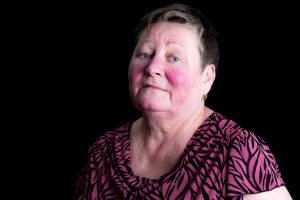Rosacea is a common skin condition characterized by reddening and the appearance of blood vessels on the face. Rosacea can also cause red bumps containing pus to develop as well as redness of the eyes and thickening of the skin on the nose- causing it to appear bigger than it really is.
Currently, there are approximately 14 million people living with rosacea in the United States. While the condition can affect anyone, it is most likely to occur in:
- Women more than men
- People between the ages of 30 and 50
- Those with a family history of rosacea
- Those who had acne when they were younger
- Those with fair skin, blue eyes and blond hair
- Smokers
The causes of rosacea are unknown; however, there are indications that suggest symptoms may present as the result of an immune response, intestinal bacteria (H. pylori), a mite found in nature or a protein in the skin that is not functioning properly.
There are triggers that can cause a flare-up of rosacea, they include: being overheated, eating spicy foods, drinking hot liquids or alcoholic beverages, strong or sudden emotions, cosmetics, medications for blood pressure, sunlight, or having cold wind blowing on the face.
There aren’t any specific tests for rosacea, but doctors will want to rule out lupus and an allergic reaction. Depending on the severity, there are a few ways to alleviate symptoms of rosacea. These include:
- Avoiding triggers
- Protecting the skin from strong sunlight by applying sunscreen or wearing protective clothing
- Using mild soap and skin cream
- Taking medications that help tighten the blood vessels
- Undergoing laser treatments
- Getting dermabrasion
If you are experiencing symptoms of rosacea, it is important that you see a physician to get an accurate diagnosis and start a treatment plan. If you would like to schedule an appointment with a physician at Flushing Hospital Medical Center, please call 718-670-5486,
All content of this newsletter is intended for general information purposes only and is not intended or implied to be a substitute for professional medical advice, diagnosis or treatment. Please consult a medical professional before adopting any of the suggestions on this page. You must never disregard professional medical advice or delay seeking medical treatment based upon any content of this newsletter. PROMPTLY CONSULT YOUR PHYSICIAN OR CALL 911 IF YOU BELIEVE YOU HAVE A MEDICAL EMERGENCY.

